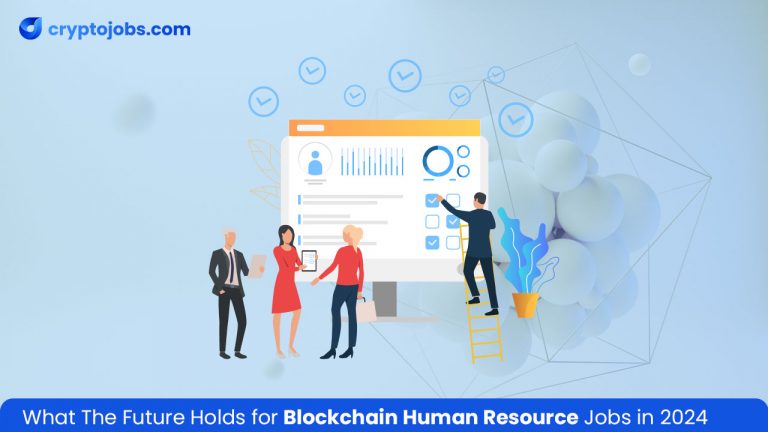
What The Future Holds for Blockchain Human Resource Jobs in 2024
- cryptojobs.com
- February 26, 2024
- All Posts, Career Guide
- Blockchain Job
- 0 Comments
Human resource (HR) management is an important function in any organization. Often called the backbone of a company, HR is responsible for supporting its most valuable asset: the workforce. This department oversees employee recruitment, training, performance evaluation, and benefits administration. However, with the emergence of blockchain technology, HR is experiencing a major transformation. Blockchain technology’s transparency and decentralized nature opens new possibilities for HR professionals.
In this article, we will explore how blockchain integration is affecting human resource jobs. We’ll explain the different ways it is changing talent management and has opened up new opportunities for HR professionals. Let’s see what the future holds for blockchain HR jobs in 2024.
The Current Landscape of Blockchain HR Jobs
The current landscape of human resource jobs is very promising. Human resource management is ranked as the 35th most promising career of the decade by the Wall Street Journal. The list comprises 800 different careers and is based on the wages and projected annual demand by the Bureau of Labour Statistics (BLS).
The BLS predicts an annual growth rate for HR jobs at 7%. This is actually greater than the national average of 5%. This is not very surprising, seeing that almost every organization has an HR department. There will be at least 16,300 new openings by 2031, as anticipated by the BLS.
The prospects of a career in HR are as bright as they are, but blockchain integration has improved them more. With its transparent nature, blockchain technology is poised to revolutionize HR processes. For example, many employees lie on their resumes. By integrating a blockchain-based verification system into their process, the HR department can easily verify the skills and competencies of potential candidates. This system will also put an end to biased recommendations and fraudulent referrals.
This system will benefit candidates too. Traditionally, when an applicant comes in, they are a blank slate for the interviewer. However, with the blockchain verification in place, the interviewer will have access to the applicant’s entire work history. Being tamper-proof will tell them how professional the candidate is and what benefits they can bring to the company.
Besides this, many new blockchain HR jobs are emerging as well. These roles are specifically focused on blockchain technology and involve tasks like managing blockchain databases, ensuring data security, and developing smart contracts for HR purposes.
Trends Shaping the Future of Blockchain HR Jobs
Looking at the future of blockchain HR jobs, we see a few trends emerging. These trends encompass everything from technological advancements to shifting industry paradigms.
Decentralization
Blockchain technology works on decentralized networks where information is stored across multiple nodes instead of in a single, central database. Meaning that in this space, there are no intermediaries; hence, these networks are completely transparent and secure. This enhances trust in HR processes such as recruitment, performance management, and payroll.
Tokenization
Tokens are digital assets that represent ownership or access rights on a blockchain network. They are quickly gaining pace in the blockchain HR industry, especially in reducing credential fraud. Tokenizing employee credentials, performance records, and certifications creates immutable records. These are then verified by employers to streamline the hiring process.
Smart Contracts
Smart contracts are set to replace traditional contracts in blockchain HR jobs. These are self-executing contracts with the terms of the agreement directly coded into the program. They are designed to execute the predefined actions automatically once the conditions of the contract are fulfilled. They are instrumental in automating various HR processes such as payroll management, employee onboarding, and performance evaluation.
AI-driven HR Solutions
AI’s integration with blockchain technology is further enhancing HR operations. By leveraging machine learning algorithms to analyze vast amounts of data, HR professionals can identify patterns, predict trends, and make data-driven decisions. These AI-driven HR solutions can be used to identify employee performance trends, optimize workforce management strategies, and improve the recruitment process.
Emerging Roles and Skills in Blockchain HR
As businesses are integrating blockchain technology into their operations, various new career avenues have opened up. These new roles are specifically focused on using blockchain applications to streamline the HR processes.
- Blockchain HR Analysts: these are the professionals who analyze data stored on blockchain networks to derive insights that assist HR decision-making. The skills required for this role include strong analytical skills and a deep understanding of blockchain technology and HR processes.
- Token Economy Specialists: People in thisrole focus on designing and implementing token-based incentive systems within organizations. They ensure that token economies align with organizational goals and promote desired behaviors among employees. This role requires expertise in tokenomics, game theory, and behavioral economics.
- Decentralized Talent Managers: Decentralized talent managers oversee talent acquisition and management processes using decentralized platforms and protocols. They leverage blockchain technology to create transparent and meritocratic systems for identifying, recruiting, and retaining top talent. A blend of HR expertise and proficiency in blockchain solutions is needed to excel in this role.
- Smart Contract Developers: Smart contract developers design and deploy smart contracts tailored to HR use cases. These contracts automate various HR processes, such as payroll, benefits administration, and performance management, while ensuring transparency and trust. You’ll need to be proficient in blockchain programming languages and smart contract development frameworks to land this job.
You may also like to read Tips for HR: 6 Strategies to Reduce Employee Turnover
Impact on Traditional HR Practices
Blockchain technology is revolutionizing traditional HR practices in several ways.
- With blockchain-based platforms, HR professionals can track employees’ skills, performance, and career development in a transparent and decentralized manner. This helps identify top talent, provide personalized training and development opportunities, and ensure fair performance evaluations.
- It reduces the risk of fraudulent resumes and streamlines the recruitment process. Job applicants can store their credentials and certifications securely on the blockchain, making it easier for employers to verify their qualifications.
- Traditional payroll systems often involve multiple intermediaries and manual processes, which can lead to errors and delays. With blockchain, payroll transactions can be recorded securely on a distributed ledger, reducing the risk of errors and fraud.
Conclusion
To sum up, the future of blockchain HR jobs in 2024 looks promising. We’ve explored how blockchain technology is revolutionizing HR practices, with numerous opportunities for growth and innovation. As HR professionals, it’s essential to embrace blockchain technology and adapt to the changing landscape. By staying informed and acquiring the necessary skills, you can position yourself for success.




